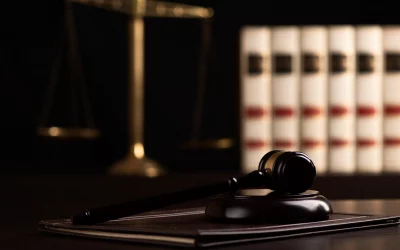Getting Money in a Personal Injury Case
Even if you have the assistance of an experienced attorney, chances are you will come across some legal terminology that you are unfamiliar with if you are injured in a preventable accident and plan to file a personal injury claim. We’re here to explain two terms you’ll almost certainly hear your lawyer use: compensatory and punitive damages. Let’s look at what they mean and how they’re used in personal injury cases.
WHAT ARE COMPENSATORY DAMAGES AND HOW DO THEY WORK?
In broad terms, you and your attorney are pursuing compensation for your injuries and losses through a personal injury lawsuit. You want to get this money from the legally obligated people to compensate them. (This obligation is referred to as liability by lawyers.)
The primary goal is to obtain compensation for you, and compensatory damages reflect that goal. Lawyers use this term to describe the various types of payment you should receive as remuneration for the physical, emotional, and financial injury you have experienced.
Alternatively, compensatory damages aim to make the injured party (you) whole again, as one popular legal maxim goes.
That isn’t exactly what they do, though. A lawsuit can’t make you whole in the sense that it can’t take away your grief, bring back a loved one who died in a sad accident, or heal a broken bone. On the other hand, compensatory damages are funds paid to you by the liable party. The amount of money you are entitled to should, in theory, be proportional to the scope and severity of the injury you have experienced.
The law recognizes two types of compensatory damages: economic damages and non- economic damages, making calculating that amount easier.
WHAT EXACTLY ARE ECONOMIC LOSSES?
Compensatory damages include several different types of losses, including economic damages. Money, financial, real, and special damages are used to describe them. They reflect the direct financial cost of a personal injury, which includes out-of-pocket expenditures and other measurable costs such as:
Current and future medical expenses associated with treating a personal injury.
Other out-of-pocket expenditures you have spent or may incur, as a result of an accident or injury, such as costs of repairing or replacing damaged property, or costs of altering your house to meet an injury-related disability
To put it another way, the economic losses component of compensatory damages aims to compensate you for the money you have lost or will likely lose as a result of your injury. Most importantly, receipts, invoices, and other documentation may be used to monitor and substantiate this spending.
NON-ECONOMIC DAMAGES: WHAT ARE THEY?
Non-economic damages, also known as general, non-pecuniary, or non-monetary damages, cover all other sorts of loss that a personal injury might inflict that do not have a monetary value.
Physical discomfort Emotional suffering Reduced pleasure of life
Impairment or loss of personal and intimate relationships
Scarring and deformity are some of the subjective but undoubtedly real damages.
Non-economic damages attempt to assign a monetary value to the more abstract difficulties that have entered your life due to the accident. Whereas economic damages can reasonably compensate you for your losses dollar-for-dollar, non-economic damages attempt to compensate you for the more abstract difficulties that have entered your life due to the accident. Although there is no agreed-upon monetary value for these challenges, your attorney must convert them into monetary terms and demonstrate how they have affected you.
Non-economic compensatory damages attempt to solve unsolvable problems such as “How valuable is your arm?” or “How much money would it take to live with severe back pain for the rest of your life?” or “How much money would it take to recompense a child’s death?” Things like this are difficult to put a price on. As a result, non-economic losses often put the law’s capacity to address human suffering to the test. Amounts might seem random at times, and state regulations may restrict how they are calculated or how large they can be.
Non-economic damages, as flawed as they are, do manage to provide personal injury victims and mourning families with some amount of justice and compensation for hurts and catastrophes they would never want to experience. They also serve as a strong and vital tool for holding wrongdoers responsible, ensuring that risky behavior cannot (or should not) be reduced to a cost-benefit analysis.
PUNITIVE DAMAGES: WHAT ARE THEY?
As previously stated, the primary goal of a personal injury case is to reimburse you for your injuries and losses. That isn’t all they do, however. Suing someone for a personal injury may often have a secondary goal of specifically punishing the party who damaged you and preventing that party (and others) from repeating such damaging behavior.
Normally, suing someone may serve as a punishment and deterrence in and of itself. The person you sue is normally responsible for the costs of defending themselves against your claim, which includes hiring a lawyer, devoting time and effort to pre-trial discovery, and dealing with the stress of facing legal and financial culpability for injurying you. As a result, the mere prospect of being sued has a significant impact on how individuals, corporations, and others operate.
However, the circumstance necessitates a more particular, focused response to misbehavior in certain cases.
Punitive damages, also known as exemplary damages, are intended to punish and discourage those who hurt others in very extreme or irresponsible ways. Only in the most unusual and severe instances are they granted by the courts. Punitive damages are extra damages given to the aggrieved person or, in certain cases, third parties, in addition to compensatory damages.
Injured parties may petition for punitive damages, but the decision to pay them is ultimately up to a judge or jury’s discretion. Punitive damages are seldom an absolute entitlement for the injured party.
Motor car accidents involving extreme misconduct, such as drunk driving or racing on public roads
Violent crimes, such as sexual assault
Withholding or falsifying information consumers need to evaluate the safety of a consumer product
Maintaining and exposing visitors to unreasonably dangerous property conditions, knowing they will be hurt
DAMAGES IN SETTLEMENTS: COMPENSATORY AND PUNITIVE
Negotiated settlements between the injured party and the party at blame (and that party’s liability insurance carrier) are the most common way to settle personal injury claims.
Settlements, in general, deal with compensatory damages, and the process of negotiating them concentrates on the proper amounts of economic and non-economic damages that an aggrieved party is entitled to. These statistics may be supported by receipts, bills, and
invoices or by consulting with physicians or economists who can predict future expenditures a victim would face.
On the other hand, punitive damages are seldom included in settlement agreements. At-fault parties in settlements often resist punitive damages. Nonetheless, an experienced personal injury lawyer may often persuade defense attorneys and insurance companies that a case justifies a greater out-of-court settlement because their client might be subjected to huge punitive penalties if the case goes to trial and is determined by a judge or jury.
IS PUNITIVE DAMAGES LEGAL IN COLORADO?
Yes, punitive damages may be recovered in a personal injury lawsuit in Colorado. Punitive damages are, however, limited under Colorado law. These restrictions are mentioned further down.
To begin, Colorado law restricts punitive/exemplary damages judgments to circumstances in which a person is injured due to fraud, malice, or gross negligence. This severely restricts the instances in which punitive damages may be sought. The injured party cannot seek punitive damages for the injury caused by ordinary negligence or error, which is the foundation of most personal injury lawsuits.
Colorado law also sets a high threshold for demonstrating punitive damages claim, requiring the aggrieved party to show that their case deserves punitive damages by clear and convincing evidence rather than a majority of the facts (which is the standard for proving liability for compensatory damages.) Furthermore, if a jury awards punitive damages, they must do so unanimously.
Finally, in many situations, Colorado law restricts punitive damage claims to the greater of the following:
$200,000, or two times the number of economic damages plus a sum equivalent to any non-economic damages determined by the jury, up to $750,000.
However, these punitive damage limitations do not apply in circumstances of injuries caused by a violent crime or some particular acts of fraud or deceit.
HOW DO PERSONAL INJURY LAWYERS KNOW WHEN PUNITIVE DAMAGES ARE NEEDED?
Whether or not to pursue punitive damages is often a judgment decision on the personal injury lawyer representing the injured person. The lawyer assesses the facts and circumstances that led to a client’s injury and compares them to other cases they have handled and/or cases that the courts have determined.
In Colorado, the attorney’s determination of whether or not fraud, malice, or gross negligence can be shown with clear and persuasive evidence is very important. Attorneys consider how pursuing punitive damages could alter how judges, juries, defense lawyers, or insurance companies see the claim in circumstances when it’s a tight call. Demanding punitive damages might make those parties sit up and take notice. On the other hand, it may backfire and cause them to reject the lawsuit as frivolous.
In rare cases, legislation may specifically permit a person who has been hurt in a specific manner by specific conduct to seek punitive damages. Attorneys will also consider such statutes when considering whether or not to advise a client to seek punitive damages.
Keep in mind that this kind of judgment is normally made in the context of pursuing punitive damages rather than compensatory damages. Almost all personal injury claims seek monetary compensation. Personal injury lawyers seldom (if ever) have to decide whether or not to pursue them. Instead, when it comes to compensatory damages, they concentrate on identifying all of the suffering caused by their clients and determining the losses that would be acceptable recompense.
HOW DO LAWYERS FIGURE OUT HOW MUCH COMPENSATORY AND PUNITIVE DAMAGES TO SEEK?
Personal injury attorneys often concentrate their efforts early in a case on calculating a realistic estimate of the amount of compensatory and (where applicable) punitive damages a client may seek. This is crucial because it allows lawyers to establish realistic expectations for their clients. When parties at responsibility and their insurers make early settlement offers, personal injury attorneys must evaluate them carefully. You should never accept less than you deserve!
Attorneys calculate compensatory economic damages by gathering and tallying all expenses. Lost wages their clients have incurred thus far as a result of an injury, as well as assessing (sometimes with the assistance of medical and financial experts) the likely future costs their clients will face.
They calculate non-economic compensatory damages by working with their clients to understand the full extent of the difficulties and challenges that the injuries have caused and then converting those injurys into a dollar amount that falls within a range of what the attorneys have seen paid to victims in similar cases.
Finally, suppose they believe a case justifies punitive damages. In that case, they go through a similar process to calculating non-economic damages: the attorney analyses the nature of the action that caused their clients’ injury to prior instances and determines a reasonable range of punitive damages.
WHAT SHOULD YOU DO IF YOU GET HURT IN A CAR ACCIDENT?
Unexpected injuries may throw your life into disarray, leaving you with mounting medical bills, mounds of debt, and a slew of physical and mental problems. You are entitled to both compensatory and punitive damages due to your troubles. A knowledgeable attorney may assist you in obtaining them.
After being injured in an accident or event, contact a professional personal injury attorney as soon as possible. In most Colorado personal injury situations, you may only have a limited period to file a lawsuit—two years or fewer in most circumstances. If you miss a deadline for taking action, you might lose important legal rights, so act quickly.










